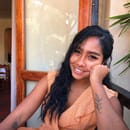What makes Her Campus UCT so special and unique from the other chapters is that our members, writers, and students are incredibly diverse. Each person has something beautiful and interesting about them – a story to share, a talent, or an outlook on life. We’d like to celebrate our diversity by zooming in on individual’s stories, speaking to them about what they’re most passionate about and letting them shine on our platform. Whether it be just for a chuckle or to actually share some wise words, we’d like to introduce a new series to Her Campus UCT: Humxns of UCT.
Our first of Humxn of UCT is Kyle Khan, a third year German, French, and Linguistics major, and our very own “polyglot” (although be probably would shy away from this huge title). This is the full interview that was conducted to share his story over social media. Never have I met someone as interesting and passionate as Kyle, especially over something most people are intimidated by. Incredibly impressed, I believe his story should be shared in full.
Which languages can you speak?
This is the most difficult question that can be posed to a language learner because, although seemingly simple, it carries so much baggage. What does it mean to “speak” a language? What about those who only study languages to be “fluent readers”? What is “fluency”? Being conversational? Being able to recognise every single word in the dictionary? By this definition, I wouldn’t even call myself a fluent English speaker. I’ve read the Harry Potter series in German, the Percy Jackson series in French, but still feel like I have many more mountains to climb before I can even say I read fluently. Speaking is another matter entirely.
Right now I’ve been aiming for “fluidity” rather than “fluency”. As with most things in life, confidence is key. If I wait until my knowledge of grammar is perfect before I start conversing with native speakers, I’d never be able to open my mouth. But if I’m able to carry a conversation without too many pauses or need for clarification, I’m happy.
Short answer, I speak English. I am decent in Afrikaaps, German and French, and have also studied Polish, Italian and Mandarin.
When did you decide to start learning languages?
A little bit before I visited Germany and France with my grade 12 History class in 2015. I didn’t learn much back then, but I was able to ask the waiter at a restaurant what “pferdefleisch” was (Hint: it’s not chicken) before making my order at a restaurant in Berlin, which made me think that speaking additional languages other than English might be useful.
Why did you decide to venture in studying multiple languages?
In the past, I’ve become obsessed with various hobbies. I’d develop a fiery passion for them, learn as much as I could in three to six months, then burn out. With languages, there is always something new to learn. Even if I reached a point where I could understand every single word in a German or French dictionary (not likely), there’d still be 7000+ other languages in the world I could tackle. In short, it’s a hobby that simply cannot become boring.
What inspires you?
It’s inspiring to watch an episode of a German TV show, or read a text in French, not understand it, but come back in a few months and have it suddenly be transparent, completely understandable. Moments where I’ve made such visible progress in my languages have been the moments where I’d be inspired to continue.
Is this easy for you?
No, not at all. Language learning is always a challenge, which is part of what makes it fun. I’ve never been close to top of the class in any of my foreign language classes. I consult dictionaries dozens and dozens of times a day. The thing is, once you learn your first foreign language, you become aware of which learning techniques work for you, and which don’t. You also realise that it is possible for you to go from not knowing a word to accessing new literature from all across the world.
Any tips and tricks for those wanting to also become a polyglot?
As with everything in life, keep grinding. Once you reach a plateau, enjoy it, appreciate the progress you’ve made, and begin climbing that next mountain. Clichés aside, my biggest practical language learning tip is to learn through comprehensible input. That is to say, literature, movies, TV shows, etc. that are just a tad above your level to make learning through context possible, but not easy enough that it becomes a passive activity. For complete beginners, courses like Assimil, Teach Yourself and Glossika are pretty great, but remember that the goal is to stop learning the language and begin living the language, as soon as possible.
Which language is next?
I have no idea. I have a long list of languages I’d like to get to, and it all depends on where my life takes me. I’m hoping to start a Master’s degree in Germany within the next few years, so, while German would remain the focus, there are so many immigrant languages which would enhance my life in Germany. I follow a YouTube channel run by Syrians living in Germany, which has led to many hours reading about Levantine Arabic and various other Arabic dialects. A Business French class project also brought Senegal into my sights, which means I’d start learning Wolof. I’ve also been reading and listening to a ton of podcasts about WW2 recently, especially the Eastern Front, so I’d consider learning Russian or Ukrainian to access more material on that. Basically, we’ll see.


